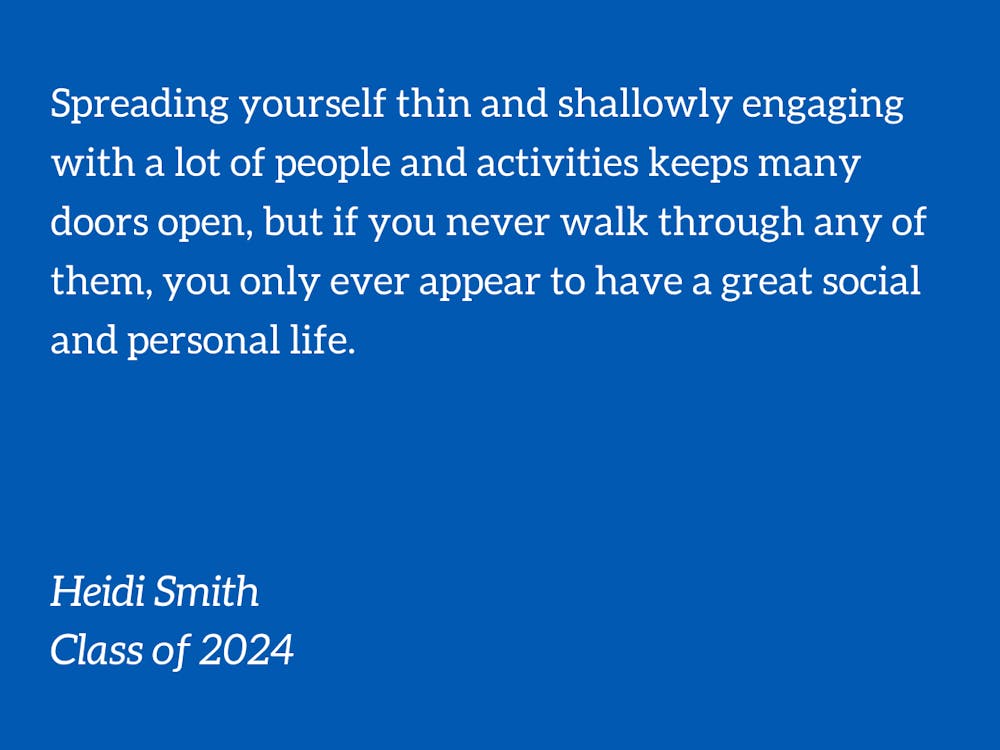When the “why Duke” question is asked, a common answer offered is that the abundance of opportunities available to students is one of the best things about our university. And I agree, the opportunities are great; beyond the tangible programs and facilities and resources, the chance to meet a wide variety of people and encounter many ideas is unparalleled and unique to this time and place in our lives. We can’t do everything, but we have the chance to do nearly anything we can imagine.
But that’s just the problem: there are too many options. There are 437,989 combinations of majors, minors and certificates and over 400 clubs to join (if you decide to join three, that’s over 63,520,800 combinations), to name a few of the many choices a Duke student is faced with. Often, this seems to lead to the lack of choice. This “paradox of choice” is a psychological phenomenon which helps explain why it can be so difficult to be satisfied when met with many similarly good options. And when surrounded by peers making different decisions than you, the things you are missing out on are hyper-present.
And so, it is easy to live shallowly, as if on autopilot. To fall into the same, easy patterns—picking one of the most common majors and clubs and career paths, eating the same few meals at WU on rotation, making intentions for plans without ever following through. To sample everything but never really eat. And this manifests nowhere better than in interpersonal relationships, particularly because they can be so taxing to cultivate, emotionally and temporally.
From my own experience and from talking to fellow students, the situation in which most of your acquaintances become people you just wave to in passing on the quad and express your wishes of grabbing lunch with soon is all too common. And these wishes remain unfulfilled unless someone shows the initiative of specifically asking and performing the back and forth of finding a mutually agreeable time, because it’s so hard to be accountable when “no one is holding your hand anymore” and you’re both “so busy” with school.
Let’s say everyone has $100 of time and energy to spend each week and you allocate $25 of yours to spend on socializing. Now, you can spend it all on one single person, give 25 people a dollar each or do anything in between. But you want the people you spend it on to also spend their time on you. So, it becomes an optimization game to make sure that you get back as much money as you put in, for both the sake of appearances and for your general social wellbeing.
I think that most students have good intentions when it comes to how they spend their lives outside of class, it’s just that these intentions are often not acted upon. We love to fill out Google Forms indicating our interest in attending events, but when the day comes, excuses are plentiful and participation is minimal. After the first few weeks of the semester when the novelty of joining new activities has worn thin, the lack of repercussions for ghosting makes clubs and other organizations an afterthought for many students.
Commitment is such an issue, I think, because it means you are forced to choose one thing and therefore give up other things. But in essence, choosing everything and choosing nothing are the same. There’s a sunk cost in the people with whom you have already spent time and the activities you have already engaged in, so changing it up can feel counterproductive, but could also lead to more enjoyment—but you won’t know until you try, which makes it all the more dangerous. But by being so preoccupied with cultivating the right relationships—and even choosing the right way to spend all of your time—nothing will ever be good enough and nothing will ever happen. Friendships will be surface level and academics will be unfulfilling, and the days will melt away like identical ice blocks.
Spreading yourself thin and shallowly engaging with a lot of people and activities keeps many doors open, but if you never walk through any of them, you only ever appear to have a great social and personal life. Which a lot of Duke students do appear to have; but, appearance is not always reality, and the lack of deeper connections in favor of more connections, but less meaningful ones, is only good for your outer image. It’s more like networking than socializing, and I can’t imagine this strategy ending in anything but lack of fulfillment. In the wise words of Aristotle and Taylor Swift: “a friend to all is a friend to none.”
The same thing goes for every other aspect of life—we must choose how to divvy up our time and energy and then must live with those decisions. While I am a strong advocate of breadth—studying a variety of subjects, trying new activities, being friends with people who are different from yourself—there needs to be a balance. At some point, a decision needs to be made, and depth must be sought. Choices should be made with the intention of a meaningful commitment, but with the knowledge that there are a lot of other choices out there, which you have the option to change to at a later time if you make an incorrect decision. It doesn’t really quite matter what we do, so much as how purposefully we do it; it’s better to have a few, really deep commitments than it is to have a lot of really shallow ones that have no great importance.
Heidi Smith is a Trinity sophomore. Her column runs on alternate Wednesdays.
Get The Chronicle straight to your inbox
Signup for our weekly newsletter. Cancel at any time.

